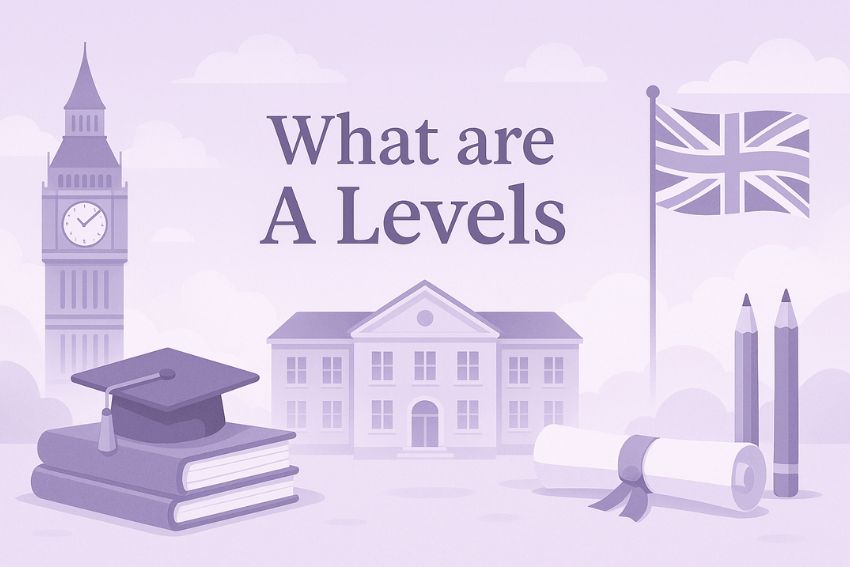Choosing A Level Subjects: What You Need to Know
A Level subjects play a crucial role in shaping a student’s academic journey and future career. Taken typically between the ages of 16 and 18, A Levels are advanced qualifications in the UK that allow students to specialise in subjects that interest them most. These subjects form the foundation for university applications and can significantly influence long-term career options.
Choosing the right A Level subjects isn’t just about picking favourites, it’s about aligning with your strengths, interests, and future goals. Whether you’re aiming for medicine, law, engineering, or the arts, your subject choices can open or limit opportunities down the line. That’s why understanding the structure and purpose of A Levels is essential before making any decisions.
In this blog, we’ll cover everything, from how many A Level subjects students typically take for university, to the best combinations for popular degree courses.
What Are A Level Subjects?
A Level subjects are advanced courses taken over two years, typically in Years 12 and 13 (Sixth Form). Designed to prepare students for university or specialised careers, A Levels allow you to dive deeper into subjects that align with your strengths and interests.
Most students choose three A Levels, although some opt for four if they are aiming for highly competitive university courses. Your school may offer guidance on how many subjects in A Level are manageable based on your academic record and goals.
There is a wide list of A Level subjects to choose from, including:
A Level Subjects
| Category | Subjects |
| Sciences | Biology, Chemistry, Physics, Environmental Science |
| Mathematics | Mathematics, Further Mathematics, Statistics |
| Humanities | History, Geography, Religious Studies, Politics |
| Social Sciences | Psychology, Sociology, Economics |
| Languages | English Literature, English Language, French, Spanish, German, Latin |
| Creative Arts | Art and Design, Drama and Theatre, Music, Photography, Textiles |
| Technology | Design and Technology, Computer Science, ICT |
| Business & Law | Business Studies, Accounting, Law |
| Physical Education | Physical Education (PE), Sports Science |
| Others | Media Studies, Film Studies, Classical Civilisation, Philosophy, Citizenship |
This flexibility means students can customise their A Level experience to match their academic direction, whether that’s science, humanities, or a mix of both.
A Level Subject Combination: Choosing the Right One
Before starting your A Levels, it’s important to understand the basic A Level requirements. Most schools and colleges ask for at least five GCSEs at grades 4–9, including English and Maths. Some A Level subjects may have their own specific requirements, for example, you may need a grade 6 or higher in GCSE Maths to take A Level Physics.
Once you’re eligible, the next step is to think carefully about your A Level subject combinations. Picking the right mix can influence your university course options and future career path. For example, combining Biology, Chemistry, and Maths is a strong choice for medicine, while History, Politics, and English can suit law.
While it’s great to follow your interests, it’s also smart to balance passion with practicality. Choose subjects you enjoy, but make sure they align with your long-term goals and the entry requirements for any careers or university degrees you’re considering.
A Level Subject List
There’s a wide list of A Level subjects to choose from, each offering a different set of skills and knowledge. To help you decide, it’s useful to look at subject categories and understand the A Level topics they typically cover.
Sciences
Subjects like Physics, Chemistry, and Biology are essential for science-based degrees. You’ll study topics such as atomic structure, genetics, and mechanics, ideal if you’re aiming for medicine, engineering, or natural sciences.
Humanities
History, Geography, and Politics encourage analytical thinking and essay writing. Expect to explore historical events, global systems, and political ideologies, useful for careers in law, journalism, or education.
Social Sciences
Psychology and Sociology focus on understanding human behaviour and society. These subjects involve research methods, theories, and real-world applications, making them popular choices among students.
Languages
A Levels in English Literature, French, Spanish, or other modern languages improve communication and analysis skills. You’ll study literature, culture, and language structure, valuable for international careers and creative fields.
Creative Arts
Subjects like Art, Drama, and Music let students express creativity. They involve practical work and coursework, offering a break from essay-heavy or calculation-based subjects.
Maths and Computing
Maths, Further Maths, and Computer Science are strong academic subjects. You’ll tackle algebra, algorithms, and statistics, which are key A Level topics for STEM-related careers.
This variety means there’s something for every student, whether you love solving equations, writing essays, or expressing yourself through performance.

A Level Subjects by Career Path
Choosing the right subjects for A Level can shape your future university choices and career path. Some careers require specific subjects, while others offer more flexibility. Below are examples of A Level subject combinations tailored to popular fields:
Engineering
For most engineering degrees, universities prefer a strong foundation in Maths and Physics. Many students also take Further Maths to strengthen their application.
Recommended A Level subjects for engineering:
- Maths
- Physics
- Further Maths (or Chemistry)
Tip: If you’re applying to top universities, Further Maths can give you a competitive edge.
Medicine
Medical schools typically require Biology and Chemistry. Some may also prefer Maths or Physics as a third subject.
Recommended A Level subjects for medicine:
- Biology
- Chemistry
- Maths or Physics
Tip: Check university-specific entry requirements, as some are stricter than others.
Law
While Law doesn’t require specific A Levels, subjects that involve reading, writing, and analysis are highly recommended.
Recommended A Level subjects for law:
- English Literature
- History
- Politics (or a language)
Tip: Choose subjects that improve essay writing and critical thinking.
Computer Science
If you’re interested in tech or programming, Maths is essential. Computer Science is useful but not always required.
Recommended A Level subjects for computer science:
- Maths
- Computer Science
- Further Maths or Physics
Tip: Develop coding skills outside of the classroom too, it’s highly valued.
Architecture
This field blends creativity with technical ability. Most courses ask for a mix of science and arts subjects.
Recommended A Level subjects for architecture:
- Maths
- Art & Design
- Physics or Design & Technology
Tip: A strong portfolio can boost your university application.
Matching your A Level subjects to your career ambitions helps ensure you’re on the right path and meet university course requirements. Always research what’s needed early so you can plan ahead.
Hardest and Easiest A Level Subjects
When choosing your A Level subjects, it’s important to understand the level of difficulty each subject may present. While it’s tempting to pick what seems like the easiest A Level subjects, remember that perceptions vary from student to student.
A Level Subject Difficulty Overview
| Hardest A Level Subjects | Easiest A Level Subjects |
| Further Maths | Sociology |
| Chemistry | Media Studies |
| Physics | Film Studies |
| History | Religious Studies |
| English Literature | Business |
Hardest A Level Subjects are often considered the most demanding due to complex content, heavy reading, and tough exams. For example, Further Maths has a steep learning curve and fast-paced lessons, while Chemistry requires both mathematical and scientific precision.
Meanwhile, Easiest A Level Subjects are often seen as more accessible due to a balance of coursework and exams, fewer mathematical demands, and a more narrative approach to content. However, “easiest” doesn’t mean “easy”, you still need consistent effort to do well.
Keep In Mind: Don’t choose a subject just because it sounds easy or hard. The best choice is one you enjoy and can succeed in. What’s challenging for one student may be the perfect fit for another.
Conclusion
Choosing your A Level subjects is one of the most important academic decisions you’ll make. It affects not just your next two years of study, but also your future university course options and career opportunities. Whether you’re aiming for A Level subjects for engineering, medicine, law, or computer science, making informed choices is key.
Be sure to check A Level requirements for the courses you’re interested in and explore different A Level subject combinations that suit your goals and interests. If you’re unsure whether to choose from the easiest A Level subjects or challenge yourself with the hardest A Level subjects, think about your strengths and long-term ambitions.
If you need support, A Level tutors can make a big difference. A good tutor can help you master difficult A Level topics, boost your confidence, and guide your revision more effectively.
Ready to succeed in your A Levels? Find expert online A Level tutors today and take the first step towards your academic goals!
FAQs:
How many A Level subjects can you take?
You can take as many as your school allows, but most students stick to three or four. Taking more might affect your performance, so focus on quality over quantity.
What are the easiest A-Level subjects?
Subjects often considered “easier” include Sociology, Media Studies, and Religious Studies. However, it depends on your strengths, there’s no truly “easy” A Level if you’re aiming for high grades.
What A Level subjects are needed for Medicine?
To study Medicine, you’ll usually need Biology and Chemistry. Some universities also prefer Maths or Physics as a third subject, but it varies by course.
What A Level subjects are needed for Law?
Law courses don’t require specific subjects, but English Literature, History, or Politics are highly recommended. Focus on subjects that build critical thinking and essay-writing skills.
Are there compulsory subjects in A Levels?
No, A Levels have no compulsory subjects. Students choose 3–4 subjects based on their interests, strengths, and future plans.
How to resit A Levels?
You can resit A Levels by registering at a school, college, or as a private candidate. Exams are usually available in the summer series.








